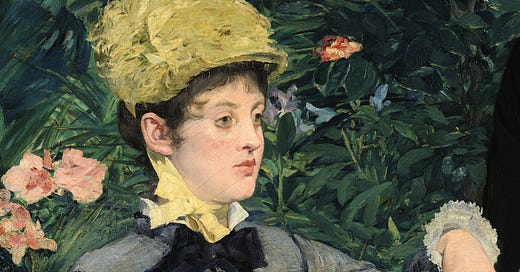A depth-plunge into and beyond taedium vitae. Part one, here, presented the history of the condition. Here we will look at its modern form. Part three looks at the boring world around us, and how to be free of it.
The First Attention Wars
Boredom means lack of interest, but what does that mean? Round youthful buttocks holds the attention of a young man, and are ‘interesting’, a warm spring meadow after a cold, dark winter holds the attention of a released prisoner, and is also ‘interesting’, but the latter beauty is radically different from the former, speaking, as it does, not to focused attention, or awareness, but to relaxed consciousness. Where an excited hyper-focus on a botty (or on a puppy dog, a Jaffa Cake or a Gucci bag) is hard, concentrated, quantitative, ‘thing-like’, and is created by wanting, by seizing upon mind-isolated things within the context, taking in a beautiful spring meadow (or a starry sky, or an artistic masterpiece, or the soft gaze of a lover) is soft, relaxed, qualitative, ‘whole-like’ and comes into experience by not-wanting, by taking in the whole of the moment. Takes it in, because it is that. I am excluded from parts of the moment, but I am included in the whole of it.
We shall return to this later. For now let us note that the ‘interest’ of consciousness is a kind of freedom for the self, although that might not be pleasant (our escaped prisoner might be in great pain), while the ‘interest’ of awareness is a kind of confinement, albeit intensely agreeable (a brothel in a prison). Consciousness and awareness are conflated by those with scant experience of the mystery of the former1 into an entirely graspable thing-like phenomenon erroneously called ‘I’. And just as this false I-phenomenon becomes a fleshy bag of appetites, faculties, phobias, memories, instincts and impressions which I can control, or manage, so other people do—indeed, as they pose a constant threat to the security of the thing that I am, they must do. To protect my self I must manage yours. This is why, at the close of the nineteenth century, when subjectivity began to sever itself completely from objectivity, controlling the threatening, thing-like attention of masses of urban subjects became an urgent practical matter.
Consciousness, at the dawn of the modern era, was completely forced into a subjective self which no longer had any immediate impact on ‘the real world’, a now distant objective thing that was henceforth the realm of those who could pay attention to it, which is to say reduce it to a graspable malleable abstraction; the class of people we now call professional ‘experts’. As Jonathan Crary exhaustively details,2 attention became, at the end of the nineteenth century, critically important to cultural managers and academics,3 because the capitalist system demanded extreme self-discipline from workers now cast adrift into a maelstrom of fleeting impressions, driven by rapid and disorienting cultural change. Sensation and conscious attention no longer belonged to you, or had to belong to you, but were artefacts which could and must belong to the system. We consider the ‘attention-economy’ a novel consequence of online existence, but attention started to become socially constructed over a century and a half ago, cut free from an in-context body, and thus radically destabilised.
Just as man had lost the centrality of his position in the universe with the dawn of the enlightenment, now, with rise of modernity, he lost the centrality—which is to say the reality—of his consciousness, which was replaced by a new fluttering, servile awareness, an internal, focusing instrument dependent on whoever or whatever could shout the loudest or shine the brightest. In becoming the source of all meaning, unconscious awareness thus ceased to be a qualitative part of the the cosmos, or of any other airy-fairy whole, and instead became a quantitative thing which not only could be managed, disciplined and developed, but had to be. Man lost his conscious centrality but gained an ever brighter awareness of the world; a world which he could no longer feel at home in, because he could only ever be external to it and, slave to his quivering, restless attention, pushed and pulled around by it.



